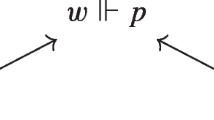Abstract
We study term modal logics, where modalities can be indexed by variables that can be quantified over. We suggest that these logics are appropriate for reasoning about systems of unboundedly many reasoners and define a notion of bisimulation which preserves propositional fragment of term modal logics. Also we show that the propositional fragment is already undecidable but that its monodic fragment (formulas using only one free variable in the scope of a modality) is decidable, and expressive enough to include interesting assertions.
Similar content being viewed by others
References
Alur, R., T. A. Henzinger, and O. Kupferman, Alternating-time temporal logic, Journal of ACM 49(5): 672–713, 2002.
Blackburn, P., Nominal tense logic, Notre Dame Journal of Formal Logic 34(1): 56–83, 1993.
Blackburn, P., M. de Rijke, and Y. Venema, Modal Logic (Cambridge Tracts in Theoretical Computer Science), Cambridge University Press, 2001.
Degtyarev, A., M. Fisher, and A. Lisitsa, Equality and monodic first-order temporal logic, Studia Logica 72(2): 147–156, 2002.
Fitting, M., and R. L. Mendelsohn, First-Order Modal Logic (Synthese Library), Springer, 1999.
Fitting, M., L. Thalmann, and A. Voronkov, Term-modal logics, Studia Logica 69(1): 133–169, 2001.
Gargov, G., and V. Goranko, Modal logic with names, Journal of Philosophical Logic 22(6): 607–636, 1993.
Grove, A. J., and J. Y. Halpern, Naming and identity in a multi-agent epistemic logic, in Proceedings of the 2nd International Conference on Principles of Knowledge Representation and Reasoning (KR’91). Cambridge, MA, USA, April 22–25, 1991, 1991, pp. 301–312.
Hodkinson, I., F. Wolter, and M. Zakharyaschev, Monodic fragments of first-order temporal logics: 2000–2001 ad, in International Conference on Logic for Programming Artificial Intelligence and Reasoning, Springer, 2001, pp. 1–23.
Hughes, M. J., and G. E. Cresswell, A New Introduction to Modal Logic, Routledge, 1996.
Kooi, B., Dynamic term-modal logic, in A Meeting of the Minds, 2007, pp. 173–186.
Kurucz, A., F. Wolter, M. Zakharyaschev, and D. M. Gabbay, Many-Dimensional Modal Logics: Theory and Applications, vol.148, Gulf Professional Publishing, 2003.
Padmanabha, A., and R. Ramanujam, Model checking a logic over systems with regular sets of processes, in Developmental Aspects of Intelligent Adaptive Systems (DIAS), vol. 1819, CEUR Workshop Proceedings, 2017.
Parikh, R., Propositional game logic, in 24th Annual Symposium on Foundations of Computer Science, Tucson, Arizona, USA, 7–9 November 1983, 1983, pp. 195–200.
Passy, S., and T. Tinchev, Quantifiers in combinatory PDL: completeness, definability, incompleteness, in Fundamentals of Computation Theory, FCT ’85, Cottbus, GDR, September 9–13, 1985, 1985, pp. 512–519.
Perea, A., Epistemic Game Theory: Reasoning and Choice, Cambridge University Press, 2012.
Sturm, H., F. Wolter, and M. Zakharyaschev, Monodic epistemic predicate logic, in European Workshop on Logics in Artificial Intelligence, Springer, 2000, pp. 329–344.
van Benthem, J., Rational dynamics and epistemic logic in games, IGTR 9(1): 13–45, 2007.
van Ditmarsch, H., W. van der Hoek, and B. Kooi, Dynamic Epistemic Logic: 337 (Synthese Library), Springer, Netherlands, 2007.
van Emde Boas, P., The convenience of tilings, Lecture Notes in Pure and Applied Mathematics, 1997, pp. 331–363.
Wolter, F., and M. Zakharyaschev, Axiomatizing the monodic fragment of first-order temporal logic, Annals of Pure and Applied Logic 118(1): 133–145, 2002.
Acknowledgements
We thank the anonymous reviewers of this journal whose comments have greatly helped to improve the content as well as the presentation. We also thank the reviewers of \(LOFT\ 2016\), and M4M9 for their valuable comments. In an earlier version of this paper, we had erroneously claimed PTML to be decidable, and M4M9 reviewers pointed this out. We thank Varuni Prabhakar for help with the figures.
Author information
Authors and Affiliations
Corresponding authors
Rights and permissions
About this article
Cite this article
Padmanabha, A., Ramanujam, R. The Monodic Fragment of Propositional Term Modal Logic. Stud Logica 107, 533–557 (2019). https://doi.org/10.1007/s11225-018-9784-x
Published:
Issue Date:
DOI: https://doi.org/10.1007/s11225-018-9784-x




